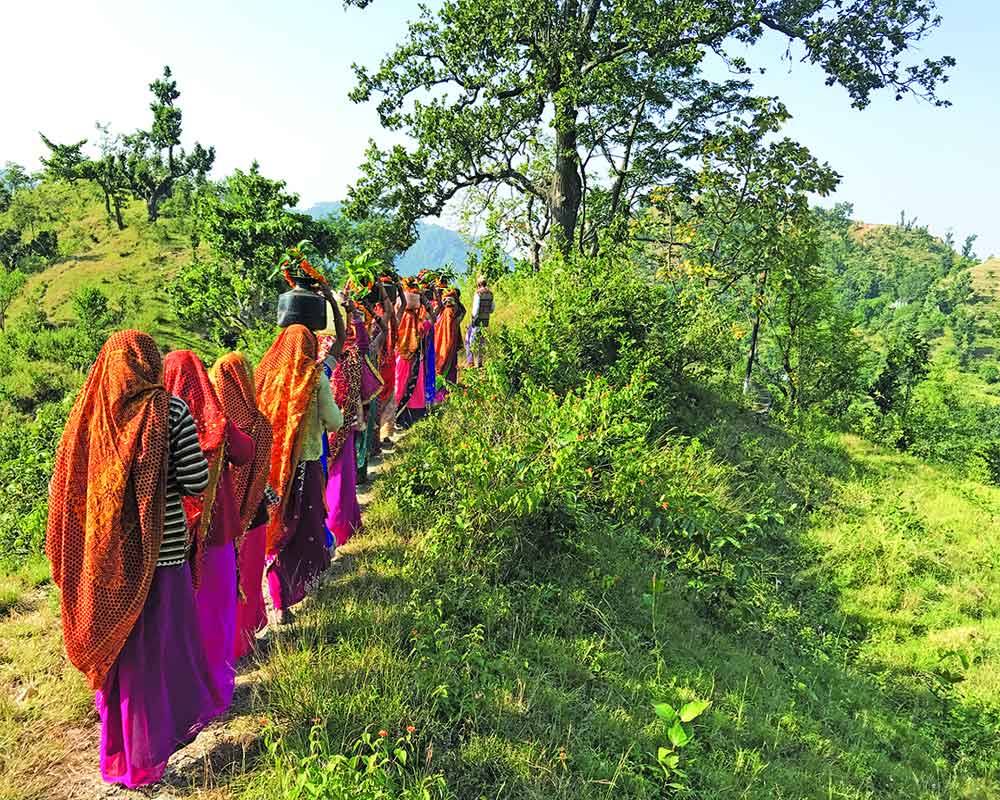Women still have to cover themselves in villages
“To be veiled is a matter of honor, and the girls who follow it are cultured,” said Paruli Devi, an elderly woman from Lamchula village in Bageshwar district in Uttarakhand. She believes that for women and girls to remain ‘cultured’ and maintain ‘respect’ for
themselves, it is significant to practice the purdah system.
Parul is not the only one to affirm this notion, as two-thirds of rural women (42 per cent) practise purdah, either as victims of this age-old practice or as a symbol of respect. On the other hand, Rekha and Nisha, two adolescent girls from the same village, questioned the veil culture in today’s world. But they are aware of how it is given utmost
importance in rural environments and how far they will be spared from following it.
“The rural society compels women and girls to practice the veil system by relating it to respect. But we believe women will receive respect when there is equality between men and women and the provision of equal opportunities,” the duo said.
“Because of the veil system, women cannot express themselves freely. The practice does not provide any respect to women. On the contrary, it affects their mental health, and should be rooted out of society,” they further added.
Although several measures have been taken by the government to curb the purdah system, the practice still persists. According to a Lokniti study conducted in 2019 under the Centre for the Study of Developing Societies (CSDS) in 11 states among 6,348 women aged 18 and older, two out of every five Indian women practice purdah.
Focusing on how purdah has been made compulsory for women mostly in rural areas, Sita Devi, the sarpanch of the village, highlighted the difficulties, saying “whenever a woman goes out of the house, it has been made mandatory for her to cover her head. By any chance if she forgets to cover, the society questions her character. The entire dignity and honour of our families are entrusted to our shoulders, and these practices are the means to retain them.”
According to her, women need to come out collectively and speak out against these malpractices. Only then, women will be able to get their rights. The purdah system allows men to exert powerful control over women and their bodies. Often, when women revolt against these practices, they are categorised as disrespectful and ill mannered. This leads to several forms of violence, be they physical or mental.
Bimla Devi, an Anganwadi worker from the village, also spoke on the same lines, explaining how not following the practice often leads to mental harassment and sometimes physical violence. Women are bound to follow it even if they don’t want to, Neelam Grundy, a social worker from the area, said, while adding that married women are blamed for not having a cultured upbringing if they believe in doing away with the purdah system.
“Tumhare Ma ne kuch nahi Sikhaya (Your mother did not teach you anything)” is the common phrase used by families to put down their daughters-in-laws. In order to avoid any criticism, women compromise and continue to practice it,” shared Neelam. Spreading awareness to eradicate the purdah system is unlikely to work, unless the root cause of patriarchy and its implications are addressed. Clearly, the purdah system and its practice by women, even if they don’t want to adhere to it, will follow until these systems are demystified amongst women.
Most importantly, to spark discussions and dialogues within the family system to better understand why women and girls are expected to uphold the family’s honour and respect.
(The author is a student of class 12 from Bageshwar, Uttarakhand: Charkha Features)




























